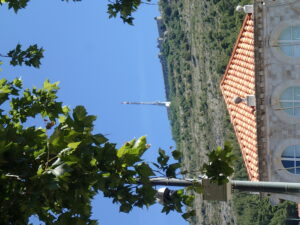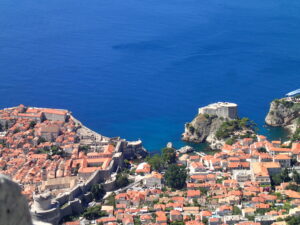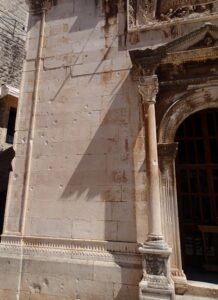I remember the Balkan war in the ‘90s. The horror of it all; of Sarajevo and Srebenica, of genocide and ethnic cleansing. I remember the Siege of Dubrovnik too, almost the place where the fighting began, but I didn’t understand why. I still don’t to this day.
 We stand next to the Amerling Fountain, Mato and me, and we look at Mount Srd, beyond the belching buses and their fumes, above the terracotta tiles of the Pucic family’s elegant summer residence, beyond the houses stacked behind, and on to the mountain itself, sentinel as ever above the city.
We stand next to the Amerling Fountain, Mato and me, and we look at Mount Srd, beyond the belching buses and their fumes, above the terracotta tiles of the Pucic family’s elegant summer residence, beyond the houses stacked behind, and on to the mountain itself, sentinel as ever above the city.
My eyes travel upwards, following his pointing finger. Above the luxuriant leaves of cypress and pine, above the scrubland strewn with rocks, steep and ever steeper, up four hundred metres to the grey bulk of Fort Imperial perched on top. The fort that saved the city.
The Serbs and Montenegrins attacked from the south, sweeping a wave of refugees before them. The attack on the mountain began on 30th September 1991 and a day later the communications centre was captured and the power cut off. No electricity, no water, would reach the city below for months.
Pockets of resistance remained. Mato’s own family home was fought over bitterly, changing hands several times as desperate local defenders staved off an army. By the middle of November the invaders had taken all of Mount Srd. Everything, that is, except the fort.
And then Mato tells me of the greatest act of heroism of all. How thirty-eight men saved the city. And it happened in front of us, at the top of Mount Srd. The miracle of 6th December 1991.
Thirty-two men manned Fort Imperial. Exhausted men, hungry and thirsty, the enemy surrounding them on almost every side. An enemy with tanks and weapons that hadn’t been made in a converted broom factory. And ammunition. The men in the fort had nothing left at all, so under cover of darkness they started to creep down the mountainside.
 Meanwhile, in perfect safety, the politicians were negotiating. The Serbs and Montenegrins had one demand. Give up the fort and we’ll stop shelling. Somehow, somehow, the message got through to a detachment of men climbing Mount Srd with ammunition. They met the shattered defenders coming down. The enemy thought they were still holding out. So they turned around and crept back.
Meanwhile, in perfect safety, the politicians were negotiating. The Serbs and Montenegrins had one demand. Give up the fort and we’ll stop shelling. Somehow, somehow, the message got through to a detachment of men climbing Mount Srd with ammunition. They met the shattered defenders coming down. The enemy thought they were still holding out. So they turned around and crept back.
Thirty-eight men with basic guns and not enough ammo. Thirty-eight men against an army. But what could they do? They went up to the roof and used them. As Mato explained, a man defending his home will fight like a tiger. An army of conscripted attackers is not so brave.
The fighting became hand to hand, the defenders desperate men, believing themselves as good as dead. But eventually they had to retreat inside. All felt lost, so they kept up their spirits by singing.
Most say it was a miracle, but Mato told me the fort’s unusual acoustics helped. Their voices filled the barrel vaults, swelling from shattered windows and walls. Sounding like a thousand men. Men the invading army were not prepared to fight.
 We walk through the cool shade of the Pile Gate, into the main street, Stradun. In the walls of the buildings, on the glossy paving stones, the bullet holes are everywhere, once you know how to look. On the morning of 6th December alone almost 700 missiles landed in the old walled city; some from ships out to sea, the rest from Mount Srd.
We walk through the cool shade of the Pile Gate, into the main street, Stradun. In the walls of the buildings, on the glossy paving stones, the bullet holes are everywhere, once you know how to look. On the morning of 6th December alone almost 700 missiles landed in the old walled city; some from ships out to sea, the rest from Mount Srd.
Like the men in the Fort, it buckled, but it did not break. The world watched as smoke blackened the skies, a bombardment so heavy that finally, finally, the world condemned and the tide of the war turned.
